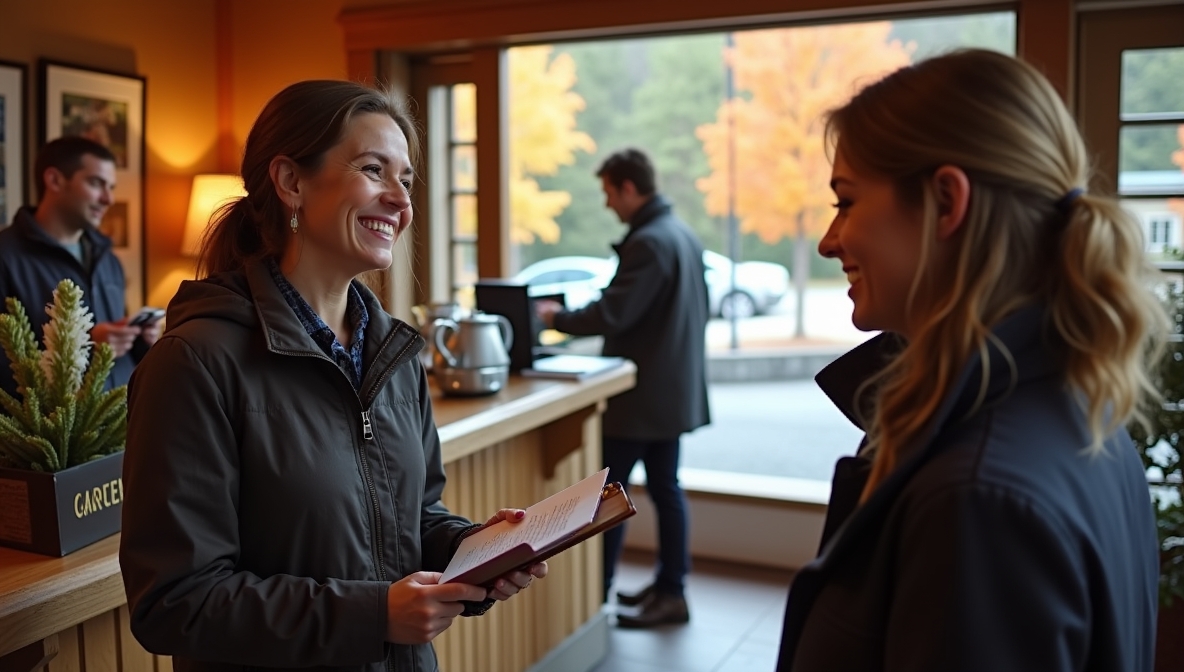Vermont hospitality background checks require careful navigation of state-specific regulations that differ significantly from neighboring states, particularly regarding access to criminal records and timing restrictions. Employers in Vermont's hospitality sector must balance thorough employee screening with strict compliance requirements under both state law and federal FCRA guidelines to avoid costly violations while maintaining safe guest environments.
Key Takeaways
- Vermont hospitality employers can access criminal records through the Vermont Crime Information Center (VCIC), but face stricter limitations than most states regarding arrest records and timing of inquiries.
- The state requires specific consent procedures and prohibits certain criminal history questions during initial application stages, with penalties up to $1,000 per violation for non-compliance.
- Background check processing times in Vermont typically range from 3-7 business days for state records, though FBI fingerprint checks can extend timelines to 14-21 days.
- Vermont's "ban-the-box" legislation affects how hospitality employers can inquire about criminal history, requiring individualized assessments before disqualification decisions.
- Small hospitality businesses including inns, B&Bs, and restaurants must comply with the same screening standards as larger hotel chains, though practical implementation differs.
- Certain hospitality positions involving vulnerable populations or financial access trigger additional screening requirements beyond standard criminal background checks.
Understanding Vermont's Hospitality Industry Background Check Landscape
Vermont's hospitality sector employs over 32,000 workers across hotels, restaurants, inns, and bed-and-breakfast establishments as of 2025. The state's unique regulatory environment creates specific challenges for employers conducting Vermont hospitality background checks, particularly for small business owners unfamiliar with compliance requirements.
Unlike states with more permissive screening laws, Vermont prioritizes applicant privacy while balancing legitimate business interests. The hospitality industry faces particular scrutiny due to guest safety concerns, property access issues, and financial transaction responsibilities. Vermont hotel employee screening must address these concerns while adhering to state regulations that limit when and how criminal history information can be requested.
Vermont's approach differs substantially from neighboring New Hampshire and Massachusetts, creating compliance challenges for multi-state hospitality operators. The state maintains centralized criminal records through VCIC, but access restrictions mean employers cannot simply order comprehensive reports without understanding legal boundaries.
Legal Framework Governing Vermont Hospitality Hiring
Vermont's employment screening laws combine state-specific statutes with federal FCRA requirements. The Vermont Fair Employment Practices Act prohibits discrimination based on criminal history unless directly related to job responsibilities, requiring employers to demonstrate legitimate business necessity for disqualification decisions. This standard applies across all hospitality positions.
The state's ban-the-box legislation restricts when employers can inquire about criminal history. Initial applications cannot include questions about convictions or arrests, and employers must wait until after initial screening or interview stages. Violations can result in civil penalties, making compliance tracking essential. Federal FCRA requirements layer additional obligations, creating a compliance matrix requiring careful documentation.
Small hospitality businesses often struggle with these requirements due to limited HR resources. However, Vermont law makes no distinction between large hotel chains and single-property B&Bs regarding screening obligations, making vendor selection and process documentation critical for all employers.
What Shows Up on Vermont Background Checks for Hospitality Workers
Vermont hospitality background checks typically include several components depending on position and employer requirements. Criminal history records form the foundation, covering felony and misdemeanor convictions from Vermont courts. The state maintains these records through VCIC, which coordinates with FBI databases for out-of-state records.
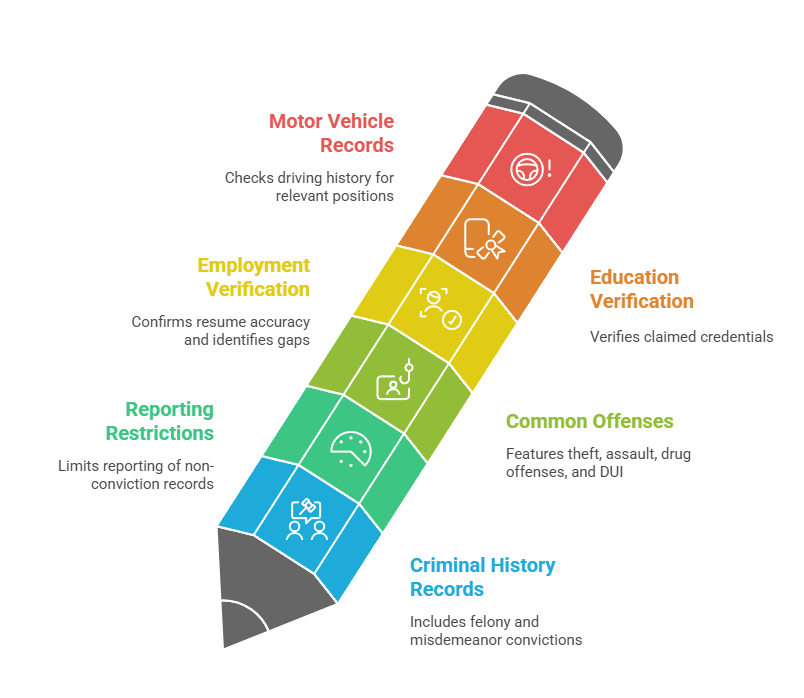
State law limits what information can be reported. Vermont follows a seven-year reporting restriction for most non-conviction records, meaning arrests not resulting in conviction generally cannot be reported beyond this timeframe. Conviction records remain reportable indefinitely, but employers must conduct individualized assessments considering offense nature, time elapsed, and job relevance.
Common offenses appearing include theft-related crimes, assault charges, drug offenses, and DUI convictions. Each requires individual evaluation based on job responsibilitiesâa theft conviction carries different implications for a housekeeper with room access versus a line cook. Vermont law requires documented assessment procedures showing how specific convictions relate to particular job duties.
Employment and Education Verification
Vermont hotel employee screening frequently includes employment history verification to confirm resume accuracy and identify unexplained gaps. While not legally required, this component helps hospitality employers assess reliability and truthfulness. Education verification confirms claimed credentials, particularly important for management positions.
These verification components typically add 2-5 business days to timelines as screening providers contact previous employers and educational institutions. Vermont law permits employers to consider employment history when making hiring decisions, though adverse actions based on employment gaps alone may raise discrimination concerns.
Motor Vehicle Records
Hospitality positions involving driving responsibilities require motor vehicle record (MVR) checks. Vermont DMV maintains driving history records including violations, suspensions, and accidents. Valet attendants, shuttle drivers, and delivery personnel all trigger MVR screening requirements.
Vermont MVRs cover in-state driving history comprehensively but may not capture out-of-state violations unless reported through interstate compacts. Multi-state screening becomes important for hospitality workers who recently relocated to Vermont.
Specific Background Check Requirements by Hospitality Position Type
Different hospitality roles trigger varying Vermont hospitality background check requirements based on job responsibilities and risk factors. While Vermont law establishes baseline standards, practical risk management often necessitates position-specific approaches.
Front-line positions involving guest interaction, property access, or financial handling warrant more comprehensive screening than back-of-house roles. However, all positions require baseline compliance with Vermont employment laws and FCRA standards. Front desk roles involve financial transactions, payment processing, and guest data access, making theft and fraud history particularly relevant. Housekeeping staff access guest rooms and personal property, creating legitimate business interests in screening for theft, burglary, and related property crimes.
Restaurant and Food Service Workers
Restaurant background check Vermont requirements vary significantly between front-of-house and back-of-house positions. Servers, bartenders, and hosts handle cash transactions and credit card information, warranting screening for financial crimes. Vermont's responsible beverage service requirements add another layer, with employers needing to verify alcohol service training.
Kitchen staff face different screening priorities centered on reliability and safety rather than financial trustworthiness. Criminal history screening remains important, but reference checks often provide more relevant information about work ethic and dependability.
Bed and Breakfast and Small Inn Operators
Small hospitality properties face unique challenges conducting background checks given limited HR infrastructure. Vermont B&B owners often hire fewer than five employees, creating compliance obligations without dedicated administrative support. Despite operational differences from large hotels, small inns must follow identical Vermont hospitality background check requirements.
The intimate nature of B&B operationsâwith employees often working alone and interacting closely with guestsâmakes thorough screening particularly important. Many B&B operators supplement formal background checks with extensive reference checking, though this must avoid practices that could violate Vermont employment discrimination laws.
How Long Do Background Checks Take in Vermont
Vermont hospitality background checks typically require 3-7 business days for completion when using established screening providers with VCIC access. This timeline covers standard criminal history checks limited to Vermont records and basic employment verification. However, several factors can extend processing times.
FBI fingerprint-based background checks add significant time, typically requiring 14-21 business days. Multi-state criminal history searches compound timeline challenges, with out-of-state searches adding 3-10 business days per jurisdiction. Employment and education verification depends on third-party responsiveness, sometimes taking 7-14 business days.
| Check Type | Processing Time | Factors Affecting Speed |
| Vermont criminal history | 3-7 business days | VCIC database responsiveness, provider efficiency |
| FBI fingerprint check | 14-21 business days | Federal processing backlog, submission accuracy |
| Multi-state criminal search | 3-10 days per state | Court system responsiveness, county accessibility |
| Employment verification | 7-14 business days | Previous employer cooperation, HR department staffing |
| Education verification | 7-14 business days | Registrar office responsiveness, verification method |
Hospitality employers can expedite this process by requesting candidates provide contact information for HR departments rather than general company phone numbers.
Vermont Ban-the-Box and Criminal History Inquiry Requirements
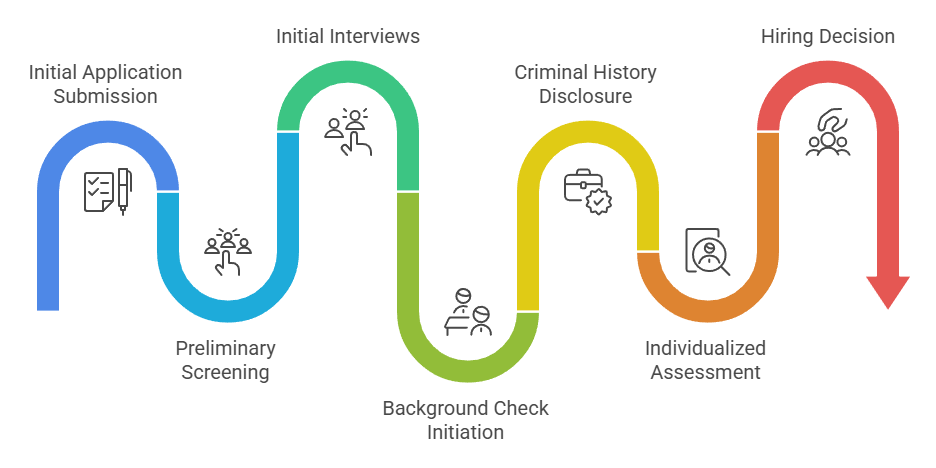
Vermont's ban-the-box legislation fundamentally changed how hospitality employers conduct criminal background inquiries. The law prohibits employers from asking about criminal history on initial employment applications, requiring these inquiries wait until after preliminary screenings or interviews. This timing restriction aims to reduce automatic disqualification of qualified candidates.
The practical impact means adjusting hiring workflows to delay criminal history inquiries. Employers cannot include questions about convictions, arrests, or pending charges on application forms. Many Vermont hospitality businesses now conduct initial phone screens or brief interviews before initiating background check procedures.
Once appropriate hiring stages complete, employers can request criminal history information through background check providers. Vermont law requires individualized assessment of any disclosed or discovered criminal history, considering offense nature, time elapsed, evidence of rehabilitation, and specific job responsibilities. Blanket disqualification policies violate state law.
Conducting Individualized Assessments
Vermont law requires employers consider multiple factors before disqualifying candidates based on criminal history. The assessment must evaluate the nature and gravity of the offense, time elapsed since conviction, and the relationship between criminal history and job responsibilities.
For hospitality positions, relevant considerations include property access concerns for theft convictions in housekeeping roles, financial responsibilities for fraud convictions in cash-handling positions, guest safety concerns for violent crime convictions, vulnerable populations when serving minors or elderly guests, and rehabilitation evidence. Vermont hospitality employers should maintain assessment forms showing factors considered and specific rationale for decisions.
Are Felons Allowed to Work in Vermont Restaurants and Hotels
Vermont law does not categorically prohibit individuals with felony convictions from hospitality employment. The state's approach emphasizes individualized assessment rather than blanket disqualification, meaning hospitality employers must evaluate specific circumstances before rejecting candidates with criminal history.
Whether felons can work in Vermont restaurants and hotels depends entirely on the specific conviction, time elapsed, and job responsibilities. A decade-old non-violent felony conviction presents different considerations than a recent violent offense. Vermont employers must conduct fact-specific analyses rather than implementing automatic disqualification policies.
Certain positions may warrant stricter screening standards based on legitimate business necessity. Hospitality roles involving vulnerable populations justify heightened scrutiny of violent offense history. Similarly, positions with financial authority reasonably consider fraud or theft convictions more heavily. Vermont law permits these distinctions provided they're consistently applied and properly documented.
FCRA Compliance for Vermont Hospitality Background Checks
Federal FCRA requirements apply to all Vermont hospitality background checks conducted through third-party screening companies. The law mandates specific disclosure and consent procedures, adverse action protocols, and accuracy obligations that supplement state law requirements.
FCRA disclosure must appear on a standalone document separate from employment applications. Vermont hospitality employers cannot bury this disclosure within lengthy application formsâit must be clear, conspicuous, and separately acknowledged by candidates. Written consent requirements follow disclosure, with candidates explicitly authorizing background check investigations.
FCRA requires a multi-step adverse action process when background check results lead to negative employment decisions. Vermont hospitality employers must first provide pre-adverse action notice including a copy of the background check report and a summary of FCRA rights. The pre-adverse action period must allow reasonable time for candidate responseâtypically 5 business days minimum.
Pre-Adverse Action Procedures
During the waiting period, Vermont hospitality employers should not make final rejection decisions or inform candidates of definite disqualification. After the pre-adverse action period, employers completing the hiring decision against the candidate must provide final adverse action notice.
This document confirms the decision, identifies the screening company, and reiterates candidates' rights to dispute report accuracy. Vermont employers must maintain documentation of both pre-adverse and final adverse action communications demonstrating FCRA compliance.
Choosing Background Check Providers for Vermont Hospitality Businesses
Selecting appropriate screening vendors significantly impacts Vermont hospitality background check effectiveness and compliance. Not all background check companies maintain proper Vermont credentials or understand state-specific reporting restrictions.
VCIC access represents a critical vendor qualification for comprehensive Vermont criminal history screening. Providers without proper Vermont authorization may rely on incomplete databases that miss state-level convictions. Confirming VCIC integration ensures criminal background checks capture all relevant Vermont court records.
FCRA compliance support distinguishes quality screening providers from basic database services. Look for vendors offering compliant disclosure forms, adverse action support, and dispute resolution assistance.
- Vermont-specific credentials with VCIC access and state reporting compliance
- FCRA compliance tools including disclosure templates and adverse action support
- Multi-state capabilities for effective out-of-state criminal record searching
- Verification breadth covering employment, education, and license verification
- Customer support with hospitality industry expertise
- Technology integration enabling applicant tracking system connectivity
- Transparent pricing with clear fee structures
Essential provider qualifications cover multiple areas that directly impact screening quality and compliance.
Drug Testing Considerations for Vermont Hospitality Workers
Vermont's evolving cannabis laws create complex considerations for hospitality employers implementing drug testing programs. The state legalized recreational marijuana in 2018, but employment protections remain limited. Hospitality employers can still maintain drug-free workplace policies and test for marijuana despite legalization.
Pre-employment drug testing remains permissible for Vermont hospitality positions, though employers must clearly communicate testing policies during hiring processes. Many hospitality businesses test for safety-sensitive positions like maintenance workers or drivers while excluding testing for lower-risk roles.
Vermont law does not protect off-duty marijuana use by employees, meaning positive tests can support adverse employment actions. However, hospitality employers should consider workforce availability challenges before implementing strict zero-tolerance marijuana policies.
Vermont Background Check Costs and Budgeting for Hospitality Employers
Vermont hospitality background checks typically cost between $25-75 per candidate depending on screening comprehensiveness. Basic criminal history checks start around $25-35, while comprehensive packages including employment verification, education confirmation, and multi-state criminal searches range from $50-75.
FBI fingerprint checks add $50-75 to background screening costs when required. Most standard hospitality roles achieve adequate screening through state criminal history checks combined with employment verification at lower cost points.
Employment and education verification pricing varies by provider. Basic employment checks confirming dates and titles typically cost $10-15 per employer, while comprehensive verification may reach $25-35 per employer. Small Vermont hospitality businesses should budget approximately $40-60 per new hire for adequate background screening.
| Screening Component | Typical Cost Range | Recommended For |
| Vermont criminal history check | $25-35 | All hospitality positions |
| Multi-state criminal check | $15-25 per additional state | Recent Vermont transplants |
| FBI fingerprint check | $50-75 | Positions serving vulnerable populations |
| Employment verification | $10-15 per employer | All hospitality positions |
| Education verification | $15-25 per institution | Management and specialized positions |
| Motor vehicle record check | $10-20 | Driving positions only |
| Drug screening | $30-50 | Safety-sensitive positions |
Seasonal hospitality operations hiring dozens of summer workers should anticipate total screening costs of $2,000-4,000 for a typical seasonal hiring wave.
Building Compliant Background Check Policies for Vermont Hospitality Operations

Effective Vermont hospitality background check programs require documented policies establishing consistent screening procedures. Written policies protect employers during regulatory investigations, support defensible employment decisions, and ensure consistent application across all candidates.
Background check policies should specify which positions undergo screening and what components are included. Not all hospitality roles require identical screeningâfront desk positions warrant financial history consideration while housekeeping positions prioritize property crime evaluation. Timing protocols ensure compliance with Vermont's ban-the-box requirements and FCRA obligations.
Policies should establish exactly when background checks are initiated during hiring processes, confirming criminal history inquiries occur only after appropriate screening stages. Comprehensive background check policies address scope definition, timing requirements, candidate notification procedures, consent documentation requirements, individualized assessment factors, adverse action protocols, record retention schedules, and confidentiality protection measures.
Policy Components for Vermont Hospitality Employers
Vermont hospitality employers should review policies annually to ensure continued compliance with evolving regulations. Annual reviews also provide opportunities to assess policy effectiveness and adjust screening approaches based on operational experience.
Documentation requirements should be emphasized throughout policy implementation. Every individualized assessment, every adverse action notice, and every consent form contributes to compliance audit trails.
Seasonal Hiring and Background Check Logistics for Vermont Tourism
Vermont's tourism-driven hospitality economy creates seasonal hiring surges requiring efficient background check logistics. Summer resort hotels, ski lodges, and seasonal restaurants must screen dozens of workers within compressed timeframes, making streamlined processes essential.
Many Vermont hospitality employers begin seasonal recruitment 6-8 weeks before operational needs to accommodate background check processing times. Early recruitment allows adequate time for comprehensive screening without rushing procedures or compromising compliance.
Conditional offer approaches balance operational urgency against screening thoroughness. Vermont hospitality employers can extend conditional employment offers pending satisfactory background check completion, allowing start date commitments while screening continues.
Rescreening Returning Seasonal Workers
Returning seasonal workers present unique background check considerations. Many hospitality businesses conduct full background checks for initial hiring then implement abbreviated annual rescreening for returning workers.
This balanced approach maintains adequate oversight without excessive costs for workers returning multiple seasons. Policies should document the rationale for rescreening intervals and apply them consistently across all returning employees.
Rights and Protections for Vermont Hospitality Job Applicants
Vermont hospitality job seekers maintain significant protections during background check processes. The combination of state employment laws and federal FCRA creates a comprehensive protection framework balancing employer screening interests against candidate privacy and fairness.
Applicants have the right to know when background checks will be conducted and must provide explicit consent before screening. Vermont hospitality employers cannot conduct surprise background checks or obtain candidate information without authorization.
Report accuracy rights allow candidates to review background check information and dispute errors. If Vermont hospitality background checks contain inaccurate information, candidates can initiate dispute procedures requiring screening companies to reinvestigate within 30 days.
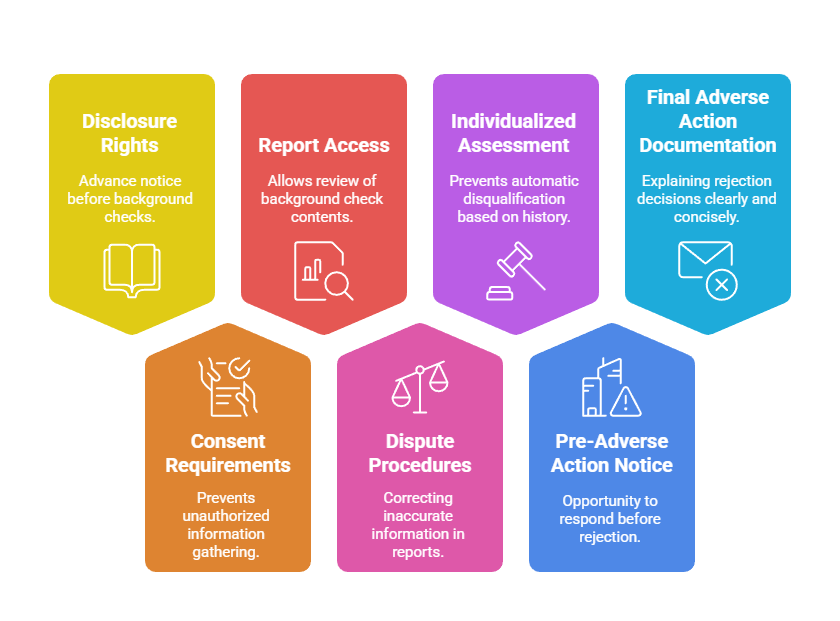
- Disclosure rights ensuring advance notice before background checks
- Consent requirements preventing unauthorized information gathering
- Report access allowing review of background check contents
- Dispute procedures for correcting inaccurate information
- Individualized assessment preventing automatic disqualification
- Pre-adverse action notice providing opportunity to respond
- Final adverse action documentation explaining rejection decisions
Ban-the-box protections mean candidates cannot be automatically disqualified based on criminal history without individualized consideration.
Continuous Monitoring and Post-Hire Background Checks
Some Vermont hospitality employers implement continuous criminal monitoring programs tracking employee arrests or convictions after hire. However, Vermont law requires specific consent for ongoing monitoring separate from initial hire background check authorization.
Continuous monitoring raises privacy considerations requiring careful policy development. Vermont hospitality employers should clearly communicate monitoring programs during hiring and obtain explicit consent beyond standard background check authorization.
Many Vermont hospitality businesses conduct annual or biennial rescreening for positions with significant guest access or financial responsibilities. Regular rescreening catches criminal activity occurring after initial hire, though the practice incurs ongoing costs requiring budget allocation.
Industry-Specific Licensing and Background Check Requirements
Certain Vermont hospitality positions trigger occupation-specific licensing requirements beyond general background checks. These specialized credentials often include integrated background screening as part of licensure processes.
Vermont alcohol and tobacco licenses require background checks for certain positions. Establishments applying for liquor licenses must identify managers and key personnel, who undergo background review as part of licensing.
Food safety certifications and food handler permits represent another hospitality-specific requirement. While Vermont doesn't require universal food handler licensing, many municipalities and health departments mandate food safety training for restaurant workers.
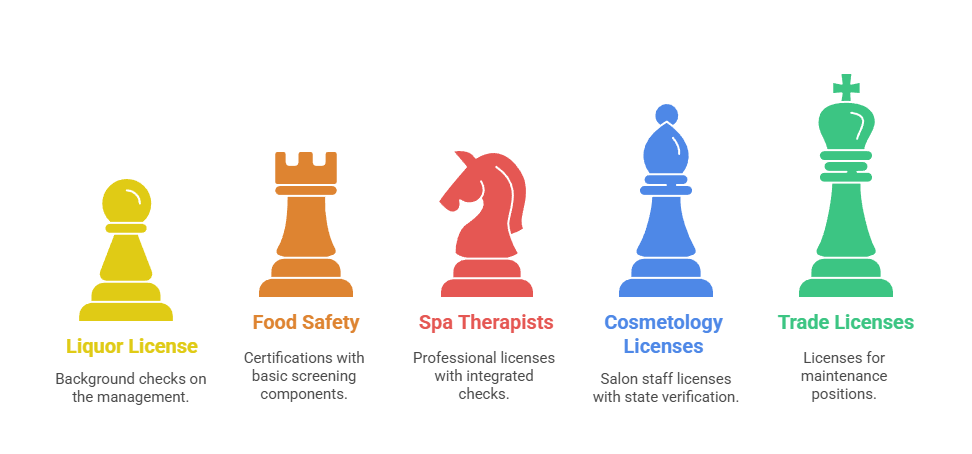
- Liquor license background reviews for management personnel
- Food safety certifications with basic screening components
- Professional licenses for spa therapists with integrated checks
- Cosmetology licenses for salon staff with state verification
- Specialized trade licenses for maintenance positions
Professional licenses for specialized hospitality roles each carry background check components within licensing processes.
Interstate Considerations for Multi-State Hospitality Operators
Hospitality businesses operating across state lines face complex compliance challenges coordinating Vermont background check requirements with other jurisdictions. A hotel chain with properties in Vermont, New Hampshire, and New York must navigate three distinct regulatory frameworks.
Vermont's ban-the-box law differs from neighboring states, creating timing inconsistencies. New Hampshire permits criminal history inquiries at any hiring stage, while Vermont restricts initial application questions. Multi-state employers must implement the most restrictive requirements across all locations or develop jurisdiction-specific hiring procedures.
Criminal history reporting restrictions vary significantly across northeastern states. Vermont's seven-year limitation on non-conviction records differs from other jurisdictions, affecting what information screening companies can report about candidates transferring between locations.
Reciprocal Licensing Arrangements
Reciprocal licensing arrangements for hospitality-related credentials simplify some multi-state complications. Many professional licenses include reciprocity provisions allowing credentials from one state to transfer to another with minimal additional requirements.
However, reciprocity doesn't eliminate background check requirementsâemployers still must conduct Vermont-compliant screening regardless of out-of-state license status.
Training Hiring Managers on Vermont Background Check Compliance
Even excellent background check policies fail without proper implementation training for hiring personnel. Vermont hospitality managers conducting recruitment must understand ban-the-box timing, individualized assessment requirements, and FCRA obligations to maintain compliance.
Training should cover when criminal history can be discussed during hiring processes. Vermont's ban-the-box law creates specific timing restrictions that hiring managers must understand. Role-playing exercises help managers practice compliant interview techniques.
Individualized assessment training proves particularly important. Managers need frameworks for evaluating criminal history relevance to specific positions, considering rehabilitation evidence, and documenting decision rationale.
FCRA Training Requirements
FCRA adverse action procedures require step-by-step training ensuring proper notice timing and documentation. Hiring managers must understand the difference between pre-adverse action and final adverse action, appropriate waiting periods, and required documents.
Documentation requirements should be emphasized throughout Vermont background check training. Every individualized assessment, every adverse action notice, and every consent form contributes to compliance audit trails.
Balancing Compliance with Operational Efficiency
Vermont hospitality employers face constant tension between thorough background screening and rapid hiring needs. Seasonal businesses particularly struggle when compressed hiring windows conflict with multi-week background check timelines.
Advanced planning represents the most effective strategy. Starting recruitment processes earlier in the season allows time for comprehensive screening without compromising operational readiness. Many successful Vermont hospitality operators maintain rolling recruitment programs rather than compressed seasonal hiring pushes.
Conditional employment offers provide operational flexibility while maintaining screening standards. Vermont hospitality employers can bring candidates into initial training or orientation pending final background check clearance.
Streamlining Background Check Processes
Process efficiency improvements can significantly reduce background check timelines without compromising thoroughness. Digital application systems, electronic consent procedures, and automated status tracking reduce administrative delays.
Vendor selection directly impacts processing speed. Vermont hospitality employers should prioritize vendor reliability over marginal cost savings when rapid hiring needs exist.
Common Background Check Mistakes Vermont Hospitality Employers Make
Vermont hospitality employers frequently make avoidable background check mistakes that create compliance liability. Understanding common pitfalls helps businesses implement more effective screening programs.
Timing violations represent the most common ban-the-box error, with employers inadvertently asking about criminal history during initial application stages. This often occurs when businesses use standard application forms obtained from other states or online templates not updated for Vermont requirements.
FCRA disclosure failures occur when employers combine background check notifications with general employment applications rather than standalone documents. Inadequate individualized assessments create another frequent compliance gap.
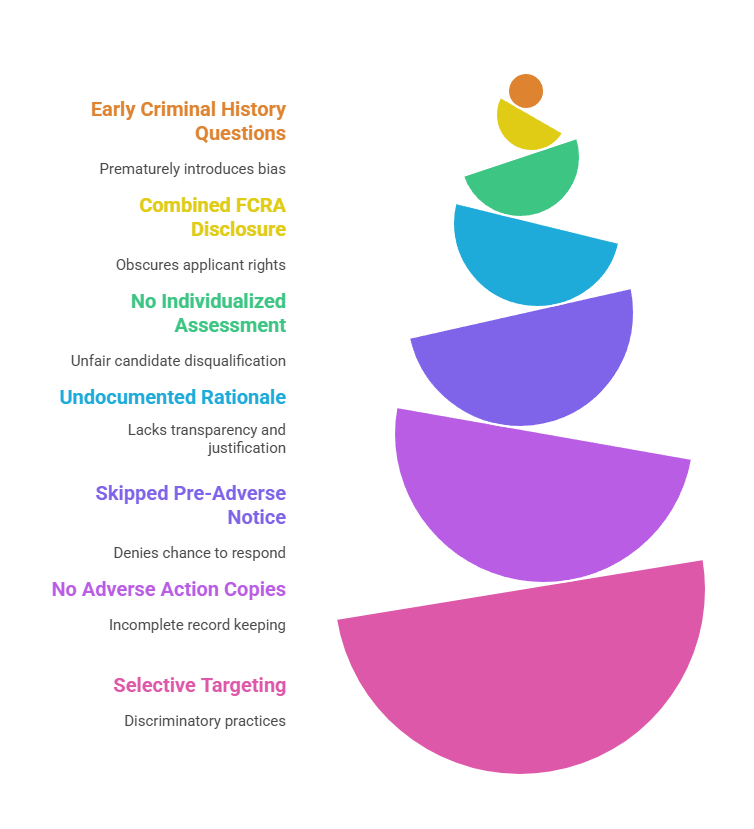
- Using application forms with criminal history questions from initial stages
- Combining FCRA disclosure with employment applications instead of standalone documents
- Disqualifying candidates based on criminal history without individualized assessment
- Failing to document assessment rationale and factors considered
- Skipping pre-adverse action notice requirements or insufficient waiting periods
- Neglecting to maintain copies of adverse action notices sent to candidates
- Implementing selective background check policies targeting specific demographics
- Using screening vendors without proper Vermont credentials or VCIC access
Documentation failures undermine otherwise compliant processes.
Understanding Vermont's Unique Approach to Criminal Justice and Employment
Vermont's background check regulations reflect broader state policy priorities around criminal justice reform and employment barriers. The state has actively worked to reduce obstacles facing individuals with criminal histories seeking employment.
Vermont's ban-the-box legislation aligns with national movements recognizing that criminal history questions on initial applications create automatic screening out of qualified candidates. Research shows that requiring individualized assessment improves employment outcomes for people with records without increasing workplace safety risks.
The hospitality industry plays a significant role in Vermont's economy and workforce development strategies. Tourism represents a major economic driver, and hospitality businesses provide critical entry-level employment opportunities.
Hiring Candidates with Criminal Histories
Vermont hospitality employers who understand this policy context can approach compliance as opportunity rather than burden. Hiring qualified candidates with criminal histories expands available talent pools in a tight labor market.
When properly screened and matched to appropriate positions, these workers often become valuable long-term employees. Vermont's individualized assessment requirements create a framework for making thoughtful hiring decisions that consider both risk factors and candidate potential.
Practical Implementation Strategies for Small Vermont Hospitality Businesses
Small Vermont hospitality businesses face unique challenges implementing comprehensive background check programs with limited resources. However, practical strategies exist to achieve compliance without overwhelming administrative capacity.
Outsourcing background checks to qualified vendors represents the most effective approach. Reputable screening companies handle technical compliance requirements including FCRA disclosure, consent procedures, and adverse action notices.
Creating simple documentation templates streamlines compliance without requiring legal expertise. Standardized application forms without criminal history questions, pre-written FCRA disclosure documents, and individualized assessment worksheets provide structure for consistent procedures.
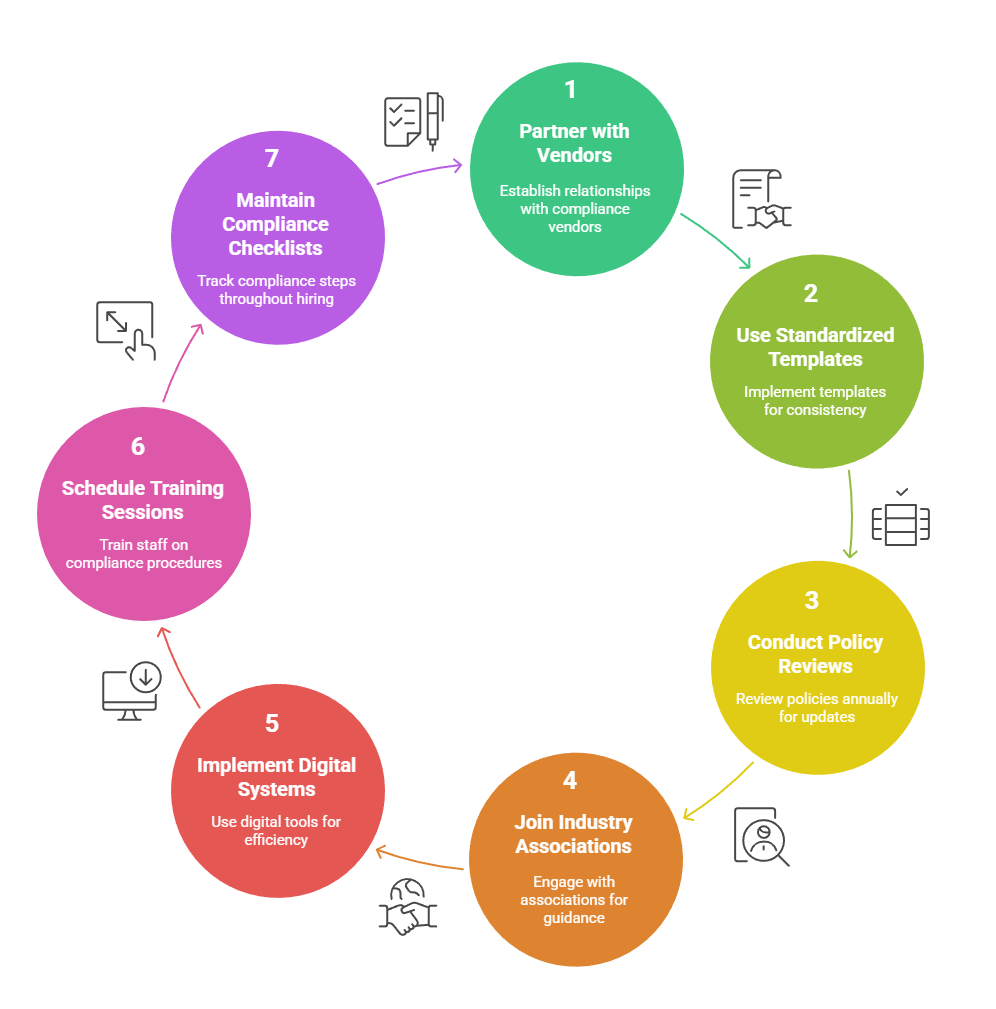
- Partner with screening vendors offering comprehensive compliance support
- Use standardized templates for applications, disclosures, and assessment forms
- Conduct annual policy reviews to ensure continued regulatory compliance
- Join industry associations providing background check guidance and resources
- Implement digital systems for document storage and retrieval
- Schedule regular training sessions for any staff involved in hiring
- Maintain compliance checklists to track required steps throughout hiring process
Vermont hospitality associations often provide members with compliance resources and vendor recommendations.
The Role of Reference Checking in Vermont Hospitality Hiring
Reference checking complements formal background screening by providing qualitative insights into candidate work history and character. While Vermont hospitality background checks reveal criminal history and verify credentials, references offer perspective on job performance, reliability, and interpersonal skills.
Vermont law doesn't restrict reference checking the way it limits criminal history inquiries. However, questions must focus on job-related matters. Asking references about attendance, performance, work quality, and reasons for leaving employment provides valuable information.
Many Vermont hospitality employers find references particularly valuable for positions where interpersonal skills and reliability matter more than technical credentials.
Effective Reference Check Procedures
Structured reference checks using consistent questions yield more reliable information. Vermont hospitality employers should develop standard reference check forms covering key job requirements.
Some previous employers limit reference information to dates of employment and job titles due to liability concerns. When encountering these restrictions, Vermont hospitality employers can ask candidates to provide alternative references such as direct supervisors.
Addressing Background Check Concerns During Candidate Interviews
Vermont's ban-the-box legislation restricts when criminal history inquiries can occur but doesn't prohibit discussing background checks once appropriate hiring stages are reached. After initial screening or interviews, Vermont hospitality employers can explain their screening procedures and address candidate concerns.
Many qualified candidates with criminal histories appreciate employers who clearly explain individualized assessment procedures. Rather than worrying about automatic disqualification, candidates understand they'll receive fair consideration based on specific circumstances.
Vermont hospitality employers should explain what their background checks include, typical processing timelines, and how results factor into hiring decisions.
Conclusion
Vermont hospitality background checks require careful attention to state-specific regulations that differ substantially from other jurisdictions, making compliance expertise essential for employers across the lodging and food service sectors. The combination of ban-the-box timing restrictions, individualized assessment obligations, and federal FCRA requirements creates a complex framework that demands systematic procedures and thorough documentation. By understanding Vermont's unique requirements, selecting qualified screening providers, and implementing comprehensive policies, hospitality employers can conduct effective background checks that protect guest safety while respecting applicant rights and avoiding costly violations.
Frequently Asked Questions
What background checks are required by law for hospitality workers in Vermont?
Vermont law does not mandate specific background checks for most hospitality positions, leaving screening decisions to employer discretion based on risk assessment and business needs. However, positions involving vulnerable populations or alcohol service may trigger specific background requirements through licensing regulations. Federal FCRA compliance remains mandatory regardless of whether state law requires screening, meaning employers choosing to conduct Vermont hospitality background checks must follow federal disclosure, consent, and adverse action procedures even when screening is voluntary.
Can Vermont hospitality employers ask about criminal history on job applications?
No, Vermont's ban-the-box legislation prohibits employers from including criminal history questions on initial employment applications. Hospitality employers must wait until after preliminary screening or interview stages before inquiring about arrests or convictions. This timing restriction aims to reduce automatic disqualification of candidates with criminal records, requiring employers to evaluate qualifications before considering criminal history. Violations can result in penalties up to $1,000 per occurrence, making compliant application design essential for Vermont hospitality businesses.
How far back do Vermont background checks go for hospitality jobs?
Vermont background checks for hospitality positions typically cover seven years for non-conviction records like arrests not resulting in conviction, following federal FCRA reporting standards. Conviction records remain reportable indefinitely without time limitations under Vermont or federal law. However, employers must conduct individualized assessments considering how much time has elapsed since convictions when making hiring decisions, with older convictions generally carrying less relevance than recent criminal activity. Multi-state background checks may involve different lookback periods depending on other states' reporting laws.
What should Vermont hospitality employers do if a background check reveals a criminal conviction?
Vermont law requires individualized assessment of criminal convictions before making adverse employment decisions, prohibiting automatic disqualification policies. Hospitality employers must evaluate the conviction's nature and gravity, time elapsed since conviction or sentence completion, and the relationship between the criminal history and specific job responsibilities. This assessment should be documented, considering rehabilitation evidence the candidate provides. Only after this individualized evaluation can employers legally reject candidates based on criminal history, and they must follow FCRA pre-adverse action procedures including notice and opportunity to dispute report accuracy.
Are Vermont restaurants and hotels required to fingerprint employees for background checks?
Vermont does not generally require fingerprint-based background checks for standard hospitality employment. Fingerprint screening through FBI databases is typically reserved for positions working with vulnerable populations or required by specific occupational licenses. Most Vermont hospitality background checks use name-based searches through state criminal databases and commercial screening services rather than more expensive and time-consuming fingerprint checks. However, individual employers can choose to implement fingerprint screening for any position if they determine enhanced security justifies the additional cost and processing time.
How much do background checks cost for Vermont hospitality businesses?
Vermont hospitality background checks typically cost $25-75 per candidate depending on comprehensiveness, with basic state criminal history checks starting around $25-35 and full packages including employment verification and education confirmation ranging $50-75. Volume discounts often reduce per-check costs for larger operations or seasonal hiring waves. Additional components like FBI fingerprint checks ($50-75), drug screening ($30-50), or multi-state criminal searches ($15-25 per state) increase total costs. Small hospitality businesses should budget approximately $40-60 per new hire for adequate screening covering criminal history and basic employment verification.
What are Vermont hospitality workers' rights during background check processes?
Vermont hospitality job applicants have rights to disclosure before background checks are conducted, to provide written consent authorizing screening, and to receive copies of background check reports when those reports lead to adverse employment decisions. Candidates can dispute inaccurate information, requiring screening companies to reinvestigate within 30 days. Under Vermont's ban-the-box law, applicants have the right to individualized assessment of any criminal history rather than automatic disqualification, with employers required to consider offense relevance to job duties before rejection decisions. FCRA provides additional rights to pre-adverse action notice and explanation when background checks result in hiring denials.
Do Vermont background check requirements differ between large hotels and small B&Bs?
No, Vermont employment and background check laws apply equally regardless of business size, meaning small B&Bs face identical compliance obligations as large hotel chains. Ban-the-box restrictions, individualized assessment requirements, and FCRA procedures apply to all Vermont hospitality employers conducting background screening. However, practical implementation differs significantlyâsmall inns typically lack dedicated HR personnel and compliance infrastructure available to larger operations. This creates proportionally greater compliance challenges for small hospitality businesses despite identical legal obligations, making vendor selection and simplified procedures particularly important for B&B owners and small inn operators.
Additional Resources
- Vermont Department of Labor - Employment Laws and Regulations
https://labor.vermont.gov/employment-laws - Vermont Crime Information Center (VCIC) Background Check Information
https://vcic.vermont.gov/background-checks - Federal Trade Commission - Background Checks: What Employers Need to Know
https://www.ftc.gov/business-guidance/resources/background-checks-what-employers-need-know - Equal Employment Opportunity Commission - Enforcement Guidance on Criminal Records
https://www.eeoc.gov/laws/guidance/arrest-conviction-records - National Employment Law Project - Ban the Box Resource Guide
https://www.nelp.org/publication/ban-the-box-fair-chance-hiring-state-and-local-guide - Vermont Hospitality Council - Industry Resources
https://www.vthospitalitycouncil.org - Professional Background Screening Association (PBSA) - Accreditation Standards
https://www.psbassociation.org - Society for Human Resource Management - State Background Check Laws
https://www.shrm.org/resourcesandtools/legal-and-compliance/state-and-local-updates

GCheck Editorial Team
Meet the GCheck Editorial Team, your trusted source for insightful and up-to-date information in the world of employment background checks. Committed to delivering the latest trends, best practices, and industry insights, our team is dedicated to keeping you informed.
With a passion for ensuring accuracy, compliance, and efficiency in background screening, we are your go-to experts in the field. Stay tuned for our comprehensive articles, guides, and analysis, designed to empower businesses and individuals with the knowledge they need to make informed decisions.
At GCheck, we're here to guide you through the complexities of background checks, every step of the way.
